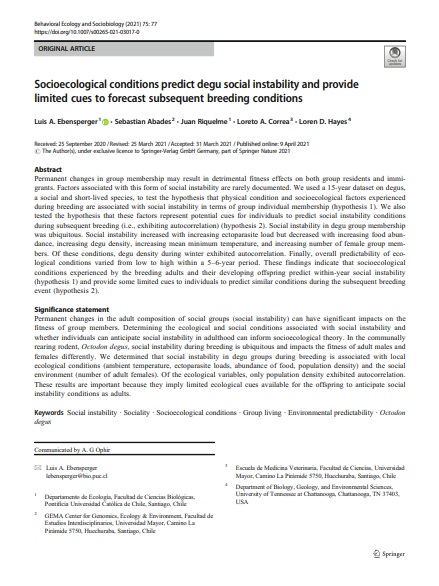Socioecological conditions predict degu social instability and provide limited cues to forecast subsequent breeding conditions

Fecha
2021-05Autor
Ebensperger, Luis A.
Abades, Sebastián [Univ Mayor, GEMA Ctr Genom Ecol & Environm, Fac Estudios Interdisciplinarios, Chile]
Riquelme, Juan
Correa, Loreto A. [Univ Mayor, Escuela Med Vet, Fac Ciencias, Chile]
Hayes, Loren D.
Ubicación geográfica
Notas
HERRAMIENTAS
Acceda a títulos restringidos
¿Cómo descargar?Resumen
Permanent changes in group membership may result in detrimental fitness effects on both group residents and immigrants. Factors associated with this form of social instability are rarely documented. We used a 15-year dataset on degus, a social and short-lived species, to test the hypothesis that physical condition and socioecological factors experienced during breeding are associated with social instability in terms of group individual membership (hypothesis 1). We also tested the hypothesis that these factors represent potential cues for individuals to predict social instability conditions during subsequent breeding (i.e., exhibiting autocorrelation) (hypothesis 2). Social instability in degu group membership was ubiquitous. Social instability increased with increasing ectoparasite load but decreased with increasing food abundance, increasing degu density, increasing mean minimum temperature, and increasing number of female group members. Of these conditions, degu density during winter exhibited autocorrelation. Finally, overall predictability of ecological conditions varied from low to high within a 5-6-year period. These findings indicate that socioecological conditions experienced by the breeding adults and their developing offspring predict within-year social instability (hypothesis 1) and provide some limited cues to individuals to predict similar conditions during the subsequent breeding event (hypothesis 2). Significance statement. Permanent changes in the adult composition of social groups (social instability) can have significant impacts on the fitness of group members. Determining the ecological and social conditions associated with social instability and whether individuals can anticipate social instability in adulthood can inform socioecological theory. In the communally rearing rodent, Octodon degus, social instability during breeding is ubiquitous and impacts the fitness of adult males and females differently. We determined that social instability in degu groups during breeding is associated with local ecological conditions (ambient temperature, ectoparasite loads, abundance of food, population density) and the social environment (number of adult females). Of the ecological variables, only population density exhibited autocorrelation. These results are important because they imply limited ecological cues available for the offspring to anticipate social instability conditions as adults.
URI
https://repositorio.umayor.cl/xmlui/handle/sibum/9176https://link-springer-com.bibliotecadigital.umayor.cl:2443/content/pdf/10.1007/s00265-021-03017-0.pdf
https://doi.org/10.1007/s00265-021-03017-0
https://link.springer.com/article/10.1007/s00265-021-03017-0
Coleccion/es a la/s que pertenece:
Si usted es autor(a) de este documento y NO desea que su publicación tenga acceso público en este repositorio, por favor complete el formulario aquí.